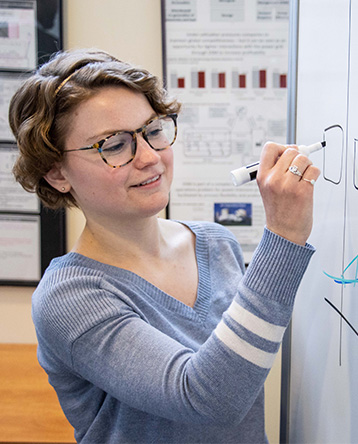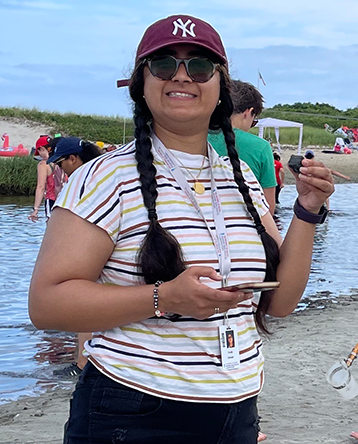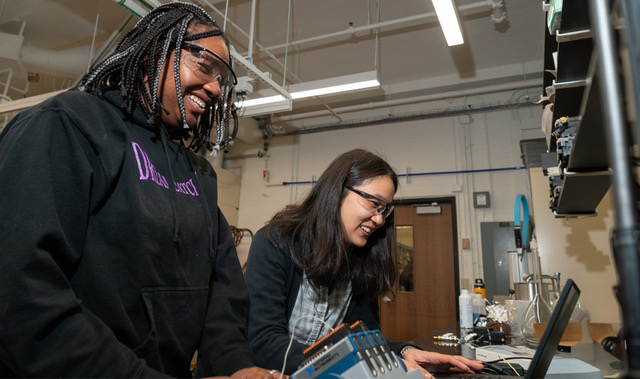Advance your career by developing groundbreaking solutions to worldwide issues, including health, sustainability, and energy. The Doctor of Philosophy (Ph.D.) in Chemical Engineering program at Carnegie Mellon University (CMU) provides unmatched opportunities to investigate captivating areas at the intersection of technology and society.
With a chemical engineering Ph.D. from CMU, you will be an independent researcher equipped to apply chemical engineering principles and advanced analytical and experimental techniques to pose and solve open-ended research problems. Complete your degree in four to five years and prepare for a career in academia, industry, or government research.
Why earn a Doctor of Philosophy in Chemical Engineering at Carnegie Mellon?
Make world-changing discoveries
CMU's chemical engineering Ph.D. program empowers you to conduct leading-edge research that tackles critical global challenges. The world-renowned faculty in the Department of Chemical Engineering leads the way in advancing impactful solutions for our world.
The department's research areas include:
- Air quality and climate
- Autonomous and data-driven sciences
- Energy, decarbonization, and sustainability
- Process systems engineering
- Biotechnology and pharmaceutical engineering
- Catalysis and surface science
- Soft materials and complex fluids
Learn in a collaborative, collegial research environment
We strive to foster a research environment that leads to fresh perspectives and trailblazing results. The faculty actively engages with colleagues across various departments at CMU and beyond. This interconnected approach enables CMU Ph.D. students to seek guidance from faculty with different areas of expertise to find novel solutions.
This collaborative ethos also extends to our facilities. The chemical engineering department has adopted an open plan for its laboratories, so students can easily share equipment and exchange ideas for new breakthroughs.
Finally, we encourage Ph.D. candidates to go beyond chemical engineering courses to select electives in related engineering and science disciplines. Cross-disciplinary studies help amplify the breadth and depth of scholarship while aligning with research goals.
Advance the state-of-the-art with your Ph.D. thesis
Our chemical engineering Ph.D. program empowers you to author and defend a thesis that advances scholarship in the field through original research. You will work closely with a faculty advisor who meets with you regularly to guide you.
You will analyze and communicate your findings in a substantive thesis and defend it before a thesis committee. You may even publish parts or all of your thesis in scientific journals or present them at conferences.
Through this rigorous process, you develop into an independent and innovative chemical engineering researcher ready to take on new challenges and make discoveries in academia or industry.
Join a supportive community for doctoral students
Our Ph.D. students hail from the United States and around the globe, and we prioritize ensuring students feel welcome in our department, whether through research groups or departmental gatherings. This culture helps students form lifelong friendships and professional connections with fellow graduate students.
Many students also join the Chemical Engineering Graduate Student Association (ChEGSA). This student-run organization helps peers bond through seminars, socials, and networking events. It also hosts the ChEGSA Symposium, a two-day event where graduate students present their ongoing research and make networking connections with industry guests and alumni.
Meet chemical engineering Ph.D. students
Curriculum for the Doctor of Philosophy in Chemical Engineering
The Ph.D. program takes four to five years to complete, depending on prior education experience.
- Direct Entry students have a bachelor's degree and can fulfill all Ph.D. requirements in four years plus two semesters.
- Advanced Entry students have a Master of Science in Chemical Engineering or similar and can complete the Ph.D. program in four years or less.
Students take advanced courses in chemical engineering and can choose to take other engineering courses in the College of Engineering. In addition, students take a Qualifying Exam and write a Research Proposal that prepares them to write and defend their Ph.D. thesis.
Learn more about the chemical engineering Ph.D. program requirements.
Meet the Department of Chemical Engineering faculty
Ph.D. students work alongside CMU’s world-class professors.
Careers and outcomes for chemical engineering Ph.D. students
A Ph.D. in chemical engineering from Carnegie Mellon opens up an expansive world of opportunity in research. Our graduates secure rewarding careers advancing innovations at leading companies and laboratories.
In 2020-2023, CMU Ph.D. graduates found roles at:
- Air Products & Chemicals
- Amgen
- AstraZeneca
- Boston Consulting Group
- Covestro
- Dow
- Eli Lilly and Company
- ExxonMobil
- Johnson & Johnson Family of Companies
- Los Alamos National Laboratory
- Northwestern University
- Princeton University
- University of California, Santa Barbara
- University of Wisconsin
Job titles for our doctorate graduates include:
- AI researcher
- Postdoctoral fellow or researcher
- Research engineer
- Research scientist
- Senior data scientist
- Senior engineer
- Senior research specialist
Median salary*: $120,000
*Based on survey results from program graduates
See more post-graduation salaries and destination information for recent CMU Ph.D. students.
Chemical engineering program Ph.D. funding
The Department of Chemical Engineering pays tuition and stipends for all full-time Ph.D. students who make sufficient progress toward degree completion. Students are required to pay for books and course supplies.
A Direct Entry student is supported for up to fourteen semesters (including summer semesters), and Advanced Entry students are supported for up to twelve semesters (including summer semesters).
Application mentorship program
At CMU, we welcome applicants of different backgrounds to apply to our chemical engineering Ph.D. program. That's why ChEGSA offers an application mentorship program that pairs prospective students with a current ChemE graduate student.
Students work one-on-one with mentors to:
- Discuss your academic journey and goals
- Ask for tips on organizing application materials
- Receive constructive feedback on your CV and essays
- Get any questions answered about the program or application process
You also receive an application fee waiver for participating in the program.
Learn more about the application mentorship program.
Admissions and application deadlines
To apply to CMU's Ph.D. in Chemical Engineering program, you should have:
- completed a bachelor's degree in chemical engineering or a related engineering or science discipline at an accredited university OR
- completed a master's degree in chemical engineering or a related engineering or science discipline at an accredited university
The Ph.D. program admits students for the fall and spring semesters.
- Fall term of entry deadline: December 15
- Spring term of entry deadline: September 1
Take the next step toward earning your chemical engineering Ph.D.
Gain expertise to advance scholarship and transform society through Carnegie Mellon University's Doctor of Philosophy in Chemical Engineering program. Our research-intensive curriculum, cross-disciplinary thinking, and world-class faculty mentors empower you to pioneer solutions to global challenges.







